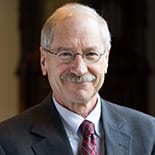News
Get to Know the New Members of BTI’s Board of Directors
BTI held its annual meeting of Members and Directors May 12-13. Each spring, members of the Scientific Advisory Board and the Board of Directors come from near and far to discuss accomplishments from the past year, as well as future directions.
This year BTI welcomes three new board members:
John W. Townsend
John W. Townsend brings considerable expertise in investing and philanthropy to BTI’s board.
Townsend is the senior advisor at Impact Investment Leaders in Park City, Utah and president of J.W. Townsend & Company, an executive search and consulting firm in New York City. He has more than 40 years of investment experience and has worked as the head of investment banking and global derivatives at Swiss global financial services company UBS and as a vice president in international corporate finance at Goldman Sachs. He is active on many nonprofit boards and for more than two decades, Townsend has served as a trustee of the Altman Foundation, a nonprofit group that seeks to increase public access to education, healthcare and the arts in New York City.
Townsend initially became involved with BTI through his association with Board Chair Laura Philips, CEO of Spheryx, Inc.
“I have a very high opinion and regard for her, so we had a couple of different conversations and I listened—she’s very persuasive,” he said.
Townsend’s interest in plant research might seem surprising, given his background in finance, but he has a keen interest in fundamental research, and in finding the means to support it financially.
“The market generally doesn’t fund basic research,” he said. “It needs to be funded through special ways, from non-profit, government or philanthropic sources.”
Alan Collmer is the Andrew J. and Grace B. Nichols Professor of plant pathology and plant-microbe biology at Cornell University. In June 2014, he became Director of the new School of Integrative Plant Science, which encompasses five former departments in the College of Agriculture and Life Sciences. He brings extensive perspective and leadership experience in plant science to his position on the Board.
Collmer has had a close connection with BTI ever since he moved back to the area in 1988 when his wife became a research associate in the laboratory of former BTI faculty member Steve Howell. More recently, Collmer teamed up with BTI’s Boyce Schulze Downey Professor Gregory Martin to study Pseudomonas syringae, a bacterium that attacks many crops, including tomato. The National Science Foundation awarded Collmer and Martin and several colleagues a research grant in 2000 to sequence the bacterium’s genome; three grant cycles later, they have progressed to using engineered strains of the pathogen to search the innate immune system of tomato for new sources of disease resistance.
Collmer joined the BTI Board of Directors to facilitate greater collaboration among the plant and soil scientists on campus, including researchers from SIPS, BTI and the U.S. Department of Agriculture Holley Center.
“We need to have a unified framework and more coordination because we’re all doing very similar things,” said Collmer. “So much of what we do in the plant sciences now is all connected, so if you have disciplinary barriers you miss out on so much opportunity and interaction.”
Susan Brown is the Herman M. Cohn professor of horticulture and plant breeding and genetics in the School of Integrative Plant Science at Cornell University, as well as the associate dean of the College of Agriculture and Life Sciences and the Goichman family director of the New York State Agricultural Experiment Station (NYSAES) in Geneva. She believes that Cornell’s Geneva campus and BTI face similar challenges and opportunities and that the two organizations can learn from each other’s approaches to advisory committees, fundraising and outreach.
Brown first learned about BTI’s excellent research as a graduate student at the University of California at Davis. Since joining the Cornell faculty, she has enjoyed attending lectures at BTI and has eagerly followed the work of its scientists. In her research, she oversees one of the world’s largest apple breeding programs and has commercialized four new apple varieties. She also uses genetics to improve apple quality, nutrition, disease resistance and tree structure.
“The tradition of excellence and the emphasis on communication at BTI resonate with me,” said Brown. “I feel I offer a unique perspective, as a Cornell faculty member and administrator at an outlying location. I am eager to learn more about BTI and to look for opportunities for increased interactions among BTI, NYSAES and the Cornell University Agricultural Experiment Station.”




